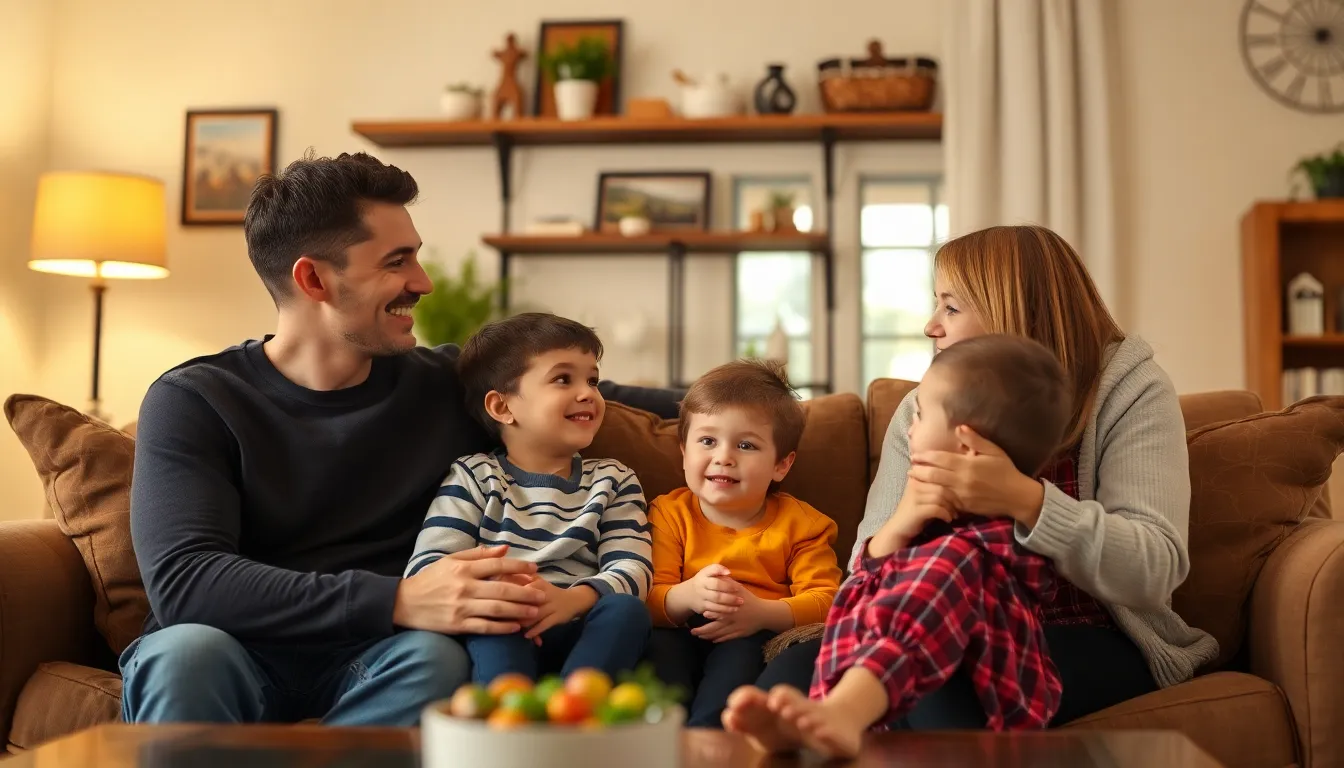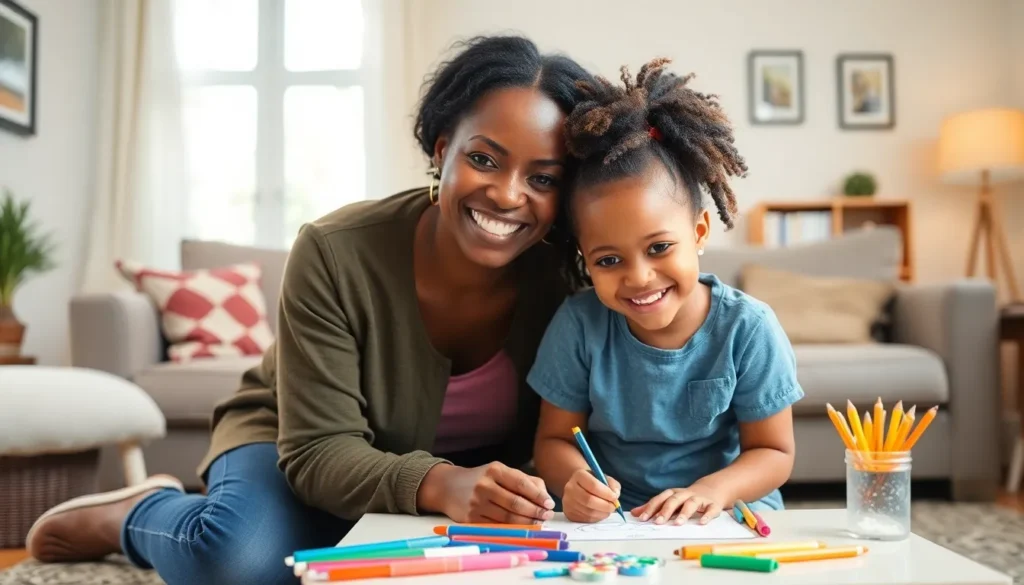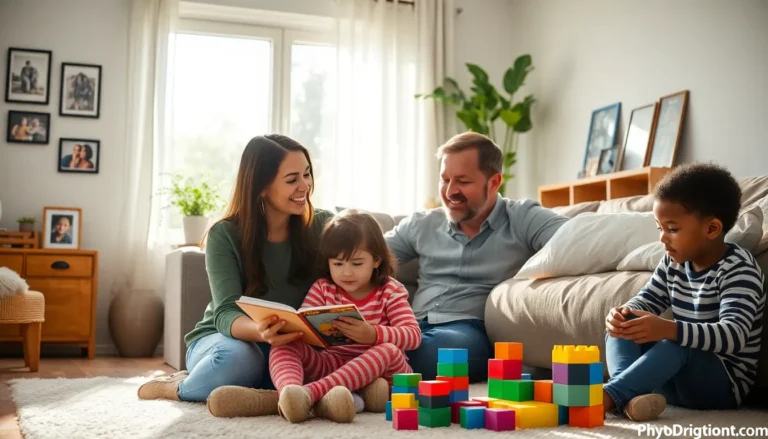Every child looks up to someone, and often that someone is a parent. The influence of a parental role model shapes a child’s values, beliefs, and behaviors, setting the foundation for their future. Parents aren’t just caregivers; they’re powerful figures who instill lessons through their actions and choices.
In a world filled with distractions and external influences, the importance of being a positive role model cannot be overstated. Children are keen observers, absorbing both the good and the bad. By embodying traits like resilience, empathy, and integrity, parents can guide their children toward becoming well-rounded individuals. Understanding this dynamic is crucial for fostering a nurturing environment that encourages growth and development.
Table of Contents
ToggleUnderstanding the Concept of Parental Role Model
Parents serve as primary role models, profoundly impacting their children’s development. Their behavior and values directly influence children’s beliefs and actions, creating a lasting foundation for their future.
Definition and Importance
A parental role model refers to a parent or guardian whose actions, choices, and ethics serve as an example for their children. This concept holds immense importance, as children often imitate the behaviors they observe in their parents. Research shows that strong parental figures contribute to children’s self-esteem, moral understanding, and overall psychological health. By embodying positive traits such as responsibility and kindness, parents shape a child’s character, helping them navigate social complexities effectively.
Types of Role Models
Role models come in various forms, each contributing uniquely to a child’s development.
- Emotional Role Models
Emotional role models demonstrate healthy emotional expression and management. They teach children to cope with feelings and stress constructively.
- Social Role Models
Social role models embody interpersonal skills, such as communication and conflict resolution. Their interactions show children how to build relationships and handle disagreements.
- Ethical Role Models
Ethical role models exemplify integrity and moral principles. They guide children in understanding right from wrong, promoting ethical behavior in various situations.
- Academic Role Models
Academic role models prioritize learning and intellectual curiosity. They emphasize the value of education, inspiring children to pursue knowledge and set academic goals.
- Physical Role Models
Physical role models advocate for health and fitness. They engage in physical activity, encouraging children to appreciate the importance of maintaining a healthy lifestyle.
By embodying these roles, parents foster an environment rich in lessons that children can carry throughout their lives.
Characteristics of an Effective Parental Role Model

Effective parental role models exhibit traits essential for influencing children positively. Key characteristics include strong communication skills and emotional intelligence, both critical for fostering healthy relationships with children.
Communication Skills
Communication skills serve as a cornerstone for effective parenting. Clear and open communication fosters trust and encourages children to express their thoughts and feelings. Active listening enables parents to understand their children’s perspectives. Parents who articulate their expectations and values help children grasp key life lessons. Engaging in regular dialogues about emotions, experiences, and challenges cultivates a supportive environment. Parents who model positive communication strategies teach children conflict resolution, respect, and active engagement.
Emotional Intelligence
Emotional intelligence plays a vital role in effective parenting. Parents with high emotional intelligence recognize their own emotions and understand their children’s feelings. This awareness allows them to respond empathetically and appropriately in various situations. Modeling emotional regulation teaches children how to handle their feelings constructively. Parents who express empathy and validation foster an atmosphere of safety and support. Through this, children learn to navigate their emotions and develop meaningful relationships, equipping them with skills for social interactions and emotional resilience.
The Impact of Parental Role Models on Children
Parental role models significantly influence children’s development and well-being. Their behaviors and attitudes shape children’s values, beliefs, and actions throughout life.
Behavioral Influences
Behavioral influences from parents significantly impact children’s social interactions and habits. Children observe and imitate their parents’ behaviors, whether positive or negative. When parents exhibit traits like kindness, respect, and perseverance, children are more likely to adopt these behaviors. Studies show that children raised in nurturing environments demonstrate higher levels of empathy and social skills. In contrast, exposure to negative behaviors, such as aggression or dishonesty, often leads children to replicate these actions. Reinforcing positive behaviors through consistent modeling establishes a foundation for healthy relationships and moral decision-making.
Academic Performance
The modeling of educational values by parents plays a crucial role in their children’s academic performance. Parents who prioritize learning and exhibit a positive attitude toward education motivate their children to excel academically. Research indicates that children whose parents actively engage in their education, such as helping with homework or attending school events, tend to achieve higher grades. Additionally, parents who encourage curiosity and critical thinking empower children to develop a love for learning. Such parental involvement fosters a supportive educational environment that leads to better academic outcomes and prepares children for future success.
Challenges Faced by Parental Role Models
Parental role models face various challenges that can impact their effectiveness in shaping their children’s development. These challenges include balancing authority with friendship and overcoming personal limitations.
Balancing Authority and Friendship
Balancing authority and friendship poses a significant challenge for parental role models. Parents often find themselves needing to enforce rules while also fostering a close relationship with their children. This duality requires careful navigation; overemphasizing authority can lead to resentment, while excessive leniency may diminish parental respect. Striking this balance involves setting clear boundaries while nurturing open communication. Parents should encourage dialogue to ensure children feel heard, promoting trust and understanding.
Overcoming Personal Limitations
Overcoming personal limitations presents another challenge for parental role models. Parents often encounter stressors, such as work demands and personal issues, which can hinder their emotional availability. These limitations may affect their ability to model positive behaviors. Self-awareness is essential; parents must acknowledge their struggles to effectively support their children. Engaging in self-care and seeking support can enhance their capacity to serve as role models. By demonstrating resilience and a commitment to growth, parents model the importance of facing challenges, thereby instilling similar values in their children.
Strategies for Being a Positive Parental Role Model
Parents can implement various strategies to foster a positive environment that benefits their children’s development. These include setting a good example and encouraging open discussions that nurture communication.
Setting a Good Example
Setting a good example encompasses demonstrating desirable behaviors consistently. Parents should exhibit resilience by handling challenges gracefully. Parents should practice empathy through understanding others’ feelings. Parents should display integrity by adhering to values honest and transparent. Parents should engage in healthy habits like regular exercise and nutritious eating, encouraging children to adopt similar lifestyles. Parents should manage conflicts objectively, showcasing effective problem-solving skills. By embodying these traits, parents establish a framework for their children’s behaviors and values.
Encouraging Open Discussions
Encouraging open discussions facilitates honest communication between parents and children. Parents should actively listen to their children, validating their thoughts and feelings. Parents should create a safe space for dialogue where children can express concerns without fear of judgment. Parents should ask open-ended questions to stimulate thoughtful conversation and deepen understanding. Parents should share experiences, illustrating practical applications of life lessons. By promoting such discussions, parents strengthen relationships and guide children in navigating complex emotions and situations.
The influence of parental role models is profound and far-reaching. By embodying positive traits and demonstrating effective communication, parents lay the groundwork for their children’s future success and well-being. The lessons learned from their parents’ actions and behaviors shape children’s values and decision-making processes throughout life.
Navigating the challenges of parenthood requires self-awareness and dedication. Parents who prioritize their growth and emotional health create a nurturing environment that fosters resilience and empathy in their children. Ultimately, the impact of a strong parental role model extends beyond the home, contributing to the development of compassionate and capable individuals who can thrive in society.






